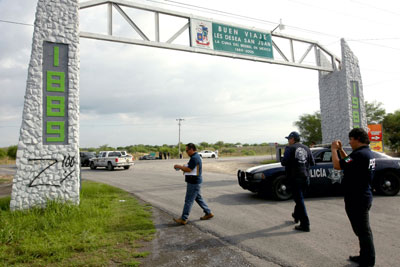They would tell you that the killers haven’t let them cover real news for several years–if you call news serious information that’s important to the public, like why the police didn’t investigate so many murders or kidnappings or extortions. Or why drugs were sold so openly. Or that three former governors are being investigated for laundering money for the organized crime cartel that runs much of the state of Tamaulipas.
If you promised not to reveal their names, the staff of the major newspaper in Nuevo Laredo would tell you that a couple of years ago, for a while, the death threats from the gang in charge of the town were so demanding that the paper had to stop covering murders of any kind. People were murdered and that was it. Maybe the police would investigate, probably not. Either way, it wouldn’t be in the paper.
The newspaper is El Mañana of Nuevo Laredo, a family-run publication founded by the grandfather of the generation in charge today. It’s part of a chain of three papers that run down the Mexican side of the border with Texas from Nuevo Laredo to the Gulf of Mexico. None of them can really cover important news anymore. But it’s much worse in Nuevo Laredo, where on May 13 the paper officially gave up and told its readers not to count on it to tell them anything about the ghastly war between two cartels that has suddenly exploded in the region. It won’t even report about conflict between organized crime groups anywhere in the country. In an editorial, the paper asked for the public’s understanding. “The newspaper will abstain for as long as necessary from publishing any information about the violent disputes that our city and other regions of the country are suffering,” the editorial stated. “The administrative and editorial councils of this company have reached this regrettable decision, which was caused by the circumstances we all know about, due to the lack of conditions for the free exercise of journalism.”
The immediate circumstances are that on May 11 the staff ducked for cover when the newspaper was attacked by gunmen who set off an explosive device outside, then shot up the façade and the parking lot. Damage was small, but the message was giant, staff told CPJ. El Mañana‘s staff took the attack as a warning from the Sinaloa Cartel that it wants news coverage of its move to take over the area from the Zeta Cartel. (It makes Sinaloa look tough.) There’s been no contact from anyone before or since the attack, said an editor. None needed. The message was clear. The problem, the lethal danger, is that journalists say they believe that the Zetas don’t want what Sinaloa is doing to be covered (it makes the Zetas look weak) and will attack the paper or its journalists if stories appear. In other words, one side threatens if there isn’t coverage and the other side threatens if there is coverage. The paper was attacked in 2006 by gunmen who shot a reporter five times and threw a hand grenade into the newsroom. The reporter is in a wheelchair and the case is unsolved.
Actually, many news organizations up and down Mexico have decided not to cover the news–not important news about how organized crime groups have taken charge in their areas. But El Mañana may be the first to stop covering all stories about all conflicts between the groups, and make the decision public.
The Zetas ruthlessly made sure for some time that nothing was reported about its activities in Nuevo Laredo. Its control was so complete that nearly a year ago the city police force was disbanded on the grounds that it was hopelessly corrupted and the army and federal police were brought in. But, as they are in many areas around the country, the Zeta and the Sinaloa cartels are now in a terrific death match in Nuevo Laredo, according to Mexican federal officials.
The city is a battleground as the cartels tear at each other and the authorities who, like the citizens, seem powerless. On April 17, 14 bodies were found in a van. On April 24, a car bomb exploded in front of the main police station, with one injury. The morning of May 5 nine bodies were hanging from an overpass, and in the afternoon 14 human heads were left near city hall. Those stories were in the paper, but the day that the editorial ran, 49 mutilated bodies were left along a highway from Monterrey, Mexico’s third largest city, to the United States. A message left with the bodies said the Sinaloa Cartel did it, according to news stories. The scene was less than 120 miles from Nuevo Laredo, but people there didn’t read about it in El Mañana.
